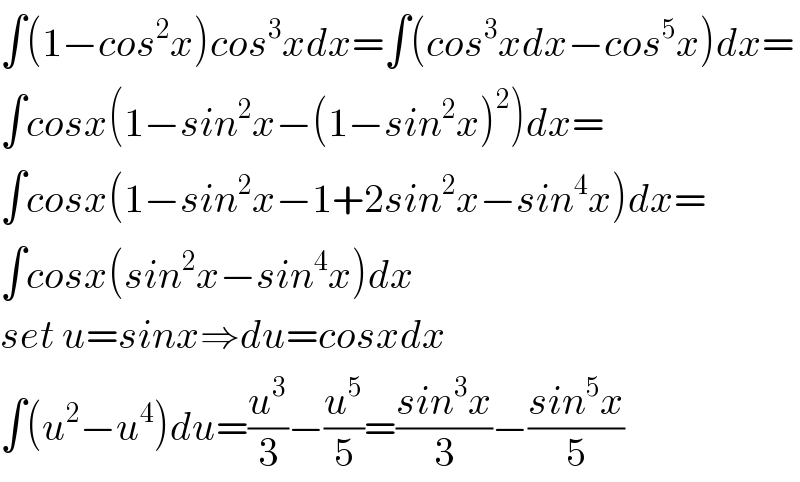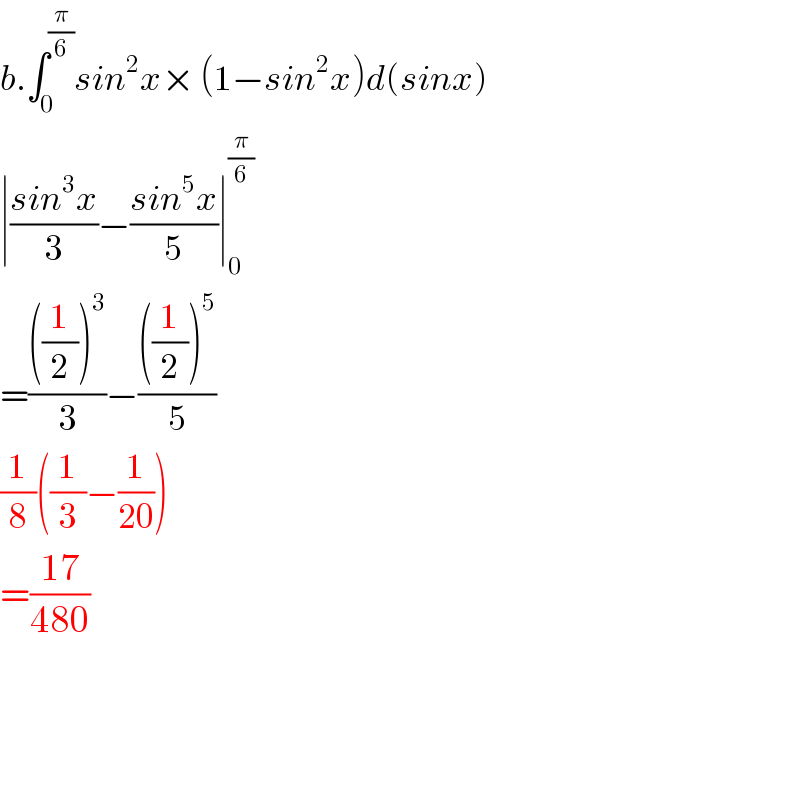
Question and Answers Forum
Question Number 66016 by Rio Michael last updated on 07/Aug/19

Commented by Prithwish sen last updated on 07/Aug/19
![b.∫_0 ^(π/6) sin^2 x(1−sin^2 x)cosxdx now put sinx=u⇒cosx dx=du ∫_0 ^(1/2) u^2 (1−u^2 )du =∫_0 ^(1/2) (u^2 −u^4 )du =[(1/3)u^3 −(1/5)u^5 ]_0 ^(1/2) =(1/(24)) − (1/(160)) =((17)/(480)) please check.](Q66025.png)
Commented by Prithwish sen last updated on 07/Aug/19
![a.lnx = t⇒(dx/x) =dt⇒dx=e^t dt ∫_0 ^(ln2) t^2 e^t dt= [t^2 e^t −2te^t +2e^t ]_0 ^(ln2) =2(ln2)^2 −4ln2+2 please check.](Q66026.png)
Commented by kaivan.ahmadi last updated on 07/Aug/19

Commented by mathmax by abdo last updated on 07/Aug/19
![a) changement lnx =t give ∫_1 ^2 (lnx)^2 dx =∫_0 ^(ln(2)) t^2 e^t dt by parts ∫_0 ^(ln(2)) t^2 e^t dt =[t^2 e^t ]_0 ^(ln(2)) −∫_0 ^(ln(2)) 2t e^t dt =2(ln2)^2 −2 { [te^t ]_0 ^(ln(2)) −∫_0 ^(ln(2)) e^t dt} =2(ln(2))^2 −2{2ln(2)−(2−1)} =2(ln(2))^2 −4ln(2) +2](Q66030.png)
Commented by mathmax by abdo last updated on 07/Aug/19
![b) let I =∫_0 ^(π/6) sin^2 x cos^3 x ⇒I =∫_0 ^(π/6) (sinxcosx)^2 cosxdx =(1/4)∫_0 ^(π/6) sin^2 2x cosx dx =(1/4) ∫_0 ^(π/6) ((1−cos(4x))/2) cosx dx =(1/8) ∫_0 ^(π/6) (cosx−cos(4x)cosx)dx =(1/8) ∫_0 ^(π/6) cosxdx −(1/8) ∫_0 ^(π/6) cos(4x)cosxdx =(1/8).(1/2) −(1/(16)) ∫_0 ^(π/6) (cos(5x)+cos3x)dx =(1/(16))−(1/(16))[(1/5)sin(5x)+(1/3)sin(3x)]_0 ^(π/6) =(1/(16))−(1/(16)){(1/(10)) +(1/3)} =(1/(16))−(1/(160))−(1/(48)) =....](Q66031.png)
Commented by Rio Michael last updated on 07/Aug/19

Answered by Tanmay chaudhury last updated on 07/Aug/19

